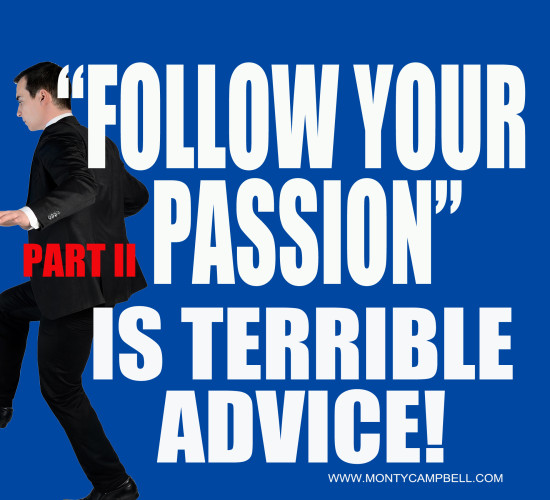There’s an old joke about the police asking the freshly caught bank robber why he robs banks. “Because that’s where the money is”, replied the thief!
I went into sales because that’s where the money was. I knew how to identify prospects, understand their problems, and how to solve them. I spent years perfecting these skills to where I made a very good living from it. Was sales my passion? Absolutely not. Although I wasn’t passionate about sales I enjoyed it nonetheless because I was good at it and it paid well. A sales career proved lucrative and helped fund my investing activities which subsequently led to me becoming financially free.
Passion Is Cultivated
Here’s a key point about passion: there probably isn’t a special passion waiting for you to discover. Passion is something that is cultivated. Something that is fostered along the way thru experiences. Therefore, it doesn’t make sense to hone-in on one thing early-on. What does make sense is to say, “I haven’t yet cultivated my passion, I should really focus on a small number of things and start the process of seeing what I really want to do in life.”
And how do you do that?
Examine your skills – what are you truly good at? What do you have a knack for? What are people complimenting you for? Focus on developing those skills and mastering them. Then look for ways to align them to large, necessary markets and careers that pay well.
Look at skill-development as an investment. Focus on developing skills that can be used to enhance your career. Look at where the market is going and follow the money. Seek mastery by understanding what skills are valued by the market you want to be working in, what skills you can and want to become excellent at relative to your competition, and how you can align the two.
Look, excitement comes and goes. True passion arises after you’ve put in the long hours to really become a craftsman in your field and can then leverage this value to really have an impact, to gain autonomy and respect, and to ultimately control your own destiny.
The focus is on what you could become good at, which may not necessarily be what you’re good at, or passionate about, now. If you’re just graduating from a university and you look only at your current strengths, you might feel that your best career options would be in art, sports, or philosophy. But narrowing your options in this way would be a grave mistake. True, you probably don’t yet have in-demand skills like sales, marketing, or computer programming. But that doesn’t mean you can’t develop them and excel in these areas.
Here’s why this is important – People with the “follow your passion” mindset ask “What do I really want?” which breeds an obsession with whether or not a job is “right” for them. They become minutely aware of everything they dislike about their work and their job satisfaction and overall happiness plummets.
By contrast, the “I’ll cultivate my passion as I go” mindset acknowledges that no matter what field you’re in, success is always about doing your best so that you can get paid the best. Once you’re focused on the quality of the work you’re doing now rather than whether or not it’s right for you, you won’t hesitate to do what is necessary to improve your skills.
And what do you get after all this focus on honing your skills and continuous improvement? You get to write your ticket. The world makes a place for those you have deep, specialized and highly sought after skills. And guess what? The world pays handsomely for them as well.
Financial Independence, Then Passion
And that brings me to the final point of this article…prioritizing financial independence. Putting financial independence before you’re passion, let you truly focus on what you love later.
You see, once you become unencumbered with what you have to do, what you really want to do will be revealed.
Bill Gates stepped down from Microsoft in his prime. Why? Because it wasn’t his passion. What is his passion? Taking on some of the world’s toughest challenges such as extreme poverty and poor health in developing countries thru his and his wife’s charity, the Bill and Melinda Gates Foundation. Building wealth thru Microsoft allowed Gates to do what he truly loves to do now.
Prioritizing financial independence doesn’t mean you stop your entire life and quit all the things that you’re passionate about right now. Becoming financially independent actually allows you to pursue your dreams even faster! It’s a matter of deciding that freedom is more important than all the other junk that gets in its way.
The question you may ask yourself is: Why become free first? Why not just wait until you are 75 to start living the life you would like? Why not subsist on a life that never seems to allow you to have quite enough money or time to be happy?
If you are dependent on your income to maintain your lifestyle, chances are good you are held captive at least forty hours a week, 50 times a year. Even if you’re passionate about what you do, is that really freedom? Sure, you may have choices, but you are still locked into a system that limits your availability of choice. The most passionate people I know, including those who are already retired, enjoy being productive even when their income is not dependent on it. Being free doesn’t necessarily mean doing nothing, it simply means not being bound to working a job for the next forty years.
Freedom may be tucking your kid in every night because you don’t have to work late again. Freedom may mean time to spend two hours exercising every day and cooking with your spouse every night. Freedom may be taking a trip to Costa Rica to learn Spanish or hiking Mount Fuji in Japan. Freedom could be having a beer during lunch and not having to worry about it. Freedom is about choice. The choice to choose, follow and live your passion.
I often hear people give new graduates this bad advice: “Do what you love and don’t work just for money.” I guess they don’t realize how they’re contradicting themselves. You can’t do what you love without money and a real job would afford you no time to do what it is you love! More than likely, the same people giving this bad advice never had the time to “follow their passion” because they never became free. Rather, they worked at a job most of their lives until it was too late to pursue their passion.
Look, success in life depends on opportunity, not a person’s passion.
Don’t Be A Precious Little Snowflake
Mike Rowe, of Dirty Jobs fame, said it best…
“When you follow your passion, when you follow your dream, when you grow up being told that you’re a precious little snowflake and all you have to do is look inward and identify that thing in you that you want more than anything else, that’s a trap,” he says.
You “take your passion with you,” Rowe says, but true success is when you pursue a great idea or opportunity.
“The people I’ve met on my journeys, by and large, didn’t set out to realize their dream,” he says. “They looked around for an opportunity. They identified the opportunity. They exploited the opportunity. They worked at the opportunity. Then they got good at the opportunity. Then they figured out how to love it.”
So, here’s my advice: Spend your energy and your skills on what makes you money. You’re going to work the same 40 hours a week at a job, whether you love it or just like it. Doesn’t it make sense to get paid the most you can during those 40 hours?
Save a portion of all the money you make and invest it wisely. Do that repeatedly and soon you’ll have a great big pile of money. Enough where you become financially free. Then, use that great big pile of money to fund the lifestyle you truly want and whatever it is that you love. That’s what I did and yes, that’s something to be passionate about!
Be free. Nothing else is worth it.
Ready for more tips on how to achieve the free life? Check-out these articles from the blog archives below:
A Wasted Life: Most People List This As Their Biggest Regret In Life. Here’s How To Avoid It.
Your Brain Is Pre-Wired For Mediocrity. Here’s How To Fix That! Includes BONUS Podcast!
The Evolution Of A Billionaire: How Warren Buffett Made His First Billion Dollars!








